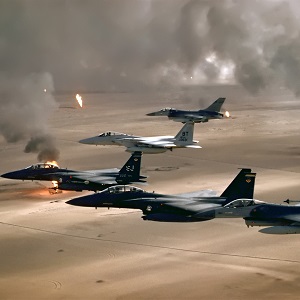Humans can be so irrational sometimes. They overreact to things and then can’t handle the consequences of their actions. I am intrigued in that they can have such small, uncalculating minds sometimes, yet they are also capable of so much in terms of creativity—though often they are only trying to find creative ways to destroy one another. A fascinating species, to say the least. Take, for example, one of the pivotal events in the Collapse leading to World War III.
In a delayed response to a series of terror strikes on 11 September 2001, United States President George W. Bush ordered the military to attack a foreign power in early 2003. The pretext was that Iraq, led by despot Saddam Hussein, had weapons of mass destruction (WMDs)—in particular, those of a nuclear nature.
Around the world, millions of people protested the impending war, stating that Iraq had no large-scale weapons. Still, the United States and several coalition allies moved forward with their strike plans, amassing troops and supplies in Kuwait. Of course, the President clearly didn’t believe that Iraq posed any serious threat, or he would have ordered a different approach in the attack.
On 19 March 2003, the United States opened hostilities with a tactical airstrike against the presidential palace in Baghdad.
On 20 March 2003, Iraq stunned the world by detonating a tactical nuclear device—the first of several—to wipe out the coalition forces as they crossed the border into Iraq. Two hours later, several more nuclear devices were detonated across Kuwait, targeting coalition bases and supply camps. The next series of targets were major oil-production fields and facilities, igniting wells across the small nation. By the time the sun set, the coalition forces had suffered losses estimated over 200,000 troops and support personnel; much of Kuwait was burning; and the United States had released the Go-Codes for the counterstrike.
The Iraqi morning of 21 March 2003 dawned over a desolate, irradiated, burning landscape. Every city or town with even a trace of military significance had been vaporized by a rain of nuclear warheads. The people who survived the initial wave of the counterstrike soon fell victim to radiation poisoning. The country ceased to exist in a thermonuclear rain of death.
The world just watched in stunned silence. Public outcry against the war evaporated—President Bush had proven that Iraq did have WMDs—but no one could decide whether the United States had taken the right action in matching Iraq’s escalation. All that was left was to figure out how to deal with the aftermath.
Initially, the Red Cross planned a humanitarian response, but the radiation levels proved to be too high. Then the United States military initiated a “humanitarian” response by sending in tactical hazmat teams to strike additional targets. Once Saddam Hussein was found and dragged out of the country (suffering from a serious case of radiation sickness) the United States issued an order that all American citizens avoid the middle-eastern wasteland. Peacecorps, Red Cross, and others were forcibly removed from the area.
The side effects of this war were deep and lasting in terms of what happened to the oil industry, terrorist groups, and the global power dynamic.
Oil Industry
The background radiation levels were high enough that no one wanted to risk personnel to go and put out the oil-well fires that now burned across the Middle East. The fires, coupled with the loss in production infrastructure, crippled OPEC in particular and the oil industry at large.
Oil superpower status began shifting away from the now-fractured Middle East to the politically volatile countries of South America, the politically blacklisted superpower of the United States, and politically weak countries of Canada and Norway, as well as several African nations.
Decreased production led to shortages throughout Europe and Asia; oil prices skyrocketed, threatening energy production and the global economy; and investigation of alternative energy took off. In particular, even though there was a renewed, Cold-War style fear of nuclear weapons, the outputs and efficiencies of nuclear power enticed developed, energy-hungry countries to begin investing in new plants. Companies also redoubled their efforts to make solar power more commercially viable.
Terrorist Groups
Following the Second Gulf War, terrorist groups underwent an interesting transformation. Those without significant, established sources of funding and supplies disappeared almost overnight. The idea that the United States would simply nuke its enemies into submission convinced a number of smaller groups to close up shop or, at least, turn their sights elsewhere—like the other, less-militant “western powers” of Europe and Japan.
Larger, better supplied terrorist groups—and nations like North Korea and Iran—simply stepped up their efforts to acquire nuclear weapons of their own. Russia suffered a number of devastating strikes during this time—aimed not at civilian centers but at older bunkers where Soviet-era decommissioned warheads were stored. An undocumented number of nuclear devices went missing during this time.
Global Power Dynamic
After the fallout settled, both literally and figuratively, the G8 (excepting the United States, making the council a G7 variant) decided to place sanctions against the United States for its decision to employ nuclear weaponry. Because of the economic might of the United States, the sanctions were minor—and never enforced—but the message rang loud and clear.
United States’ citizens began protesting the sanctions, pushing for more separatist actions. Expatriates were called home, cutting business leadership out of developing nations; Immigration and Customs Enforcement (ICE) was given sweeping power to crack down on illegal aliens—especially suspected terrorists; a conservative Supreme Court upheld a Presidential Declaration that the Constitution and Bill of Rights apply only to American citizens, granting sweeping authorization for the use of violence to maintain national identity and security; foreign nationals were forcibly expelled from the country; and non-citizen, suspected terrorists were rounded up and brutally tortured—with tentative public support—or, at least, the public’s willful “blind eye.”
While the United States maintained “open” diplomatic relations with other global powers, the country took major steps to remove itself from the global stage. Instead of trying to act in a global, peace-keeping role, the United States shifted its focus to internal control and stability—particularly energy independence. This fracturing of the global political scene made possible later global problems which, ultimately, escalated to become World War III.
All because humans couldn’t figure out how to get along. Ironically, if the United States had focused inwardly at an earlier date, rather than attacking Iraq, the entire collapse of humanity might have been avoided.












Comments (0)
See all